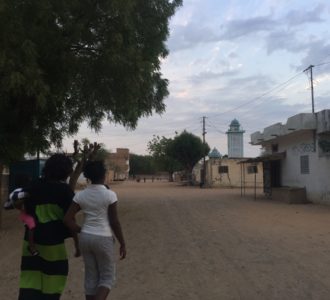
The first thing I noticed when I returned were the trees. We rode in a bus through the Redwoods, my heart leaping anxiously every time I forgot we were in a vehicle, which was often (there were no bumps on this road). It was curvy, and with every turn I was irrationally convinced we would tip over – but none of that mattered because the trees were so tall. They stood without space between them, their arms around eachother covering up the sky that was already hidden with clouds. Where I come from, I thought, trees have space between them. Big, open, sandy spaces where people do laundry and play soccer and sip juice from small plastic bags. They stand separated from their kind, nothing and nobody to synchronize with. I had learned, in time, to be one of them; no longer did I need trees of my kind next to me, whispering, validating at every moment that I was still a tree.
Now that I have returned from the wide open place, I see the “identity” that I left behind here as not an identity at all; stories, they were; people, places, materials that weaved themselves into a fabric I wrapped myself up in every night. I’m finding that the blanket is no longer comfortable because I’ve spent 8 months learning to live without it.
To learn yourself for the first time, apart from the stories that tell you who you are, is electrifying. It is vital, so transformative that I expected upon return for my purest self to continue burning brightly inside of me. Naive, maybe, I realize now, to think that the blanket of my past would cease from creeping back around my recovered identity. It is hard. Hard to remain accountable to the person I found in Senegal, hard to find her voice in the noise – but she fights. She is gentle to the people who don’t understand, she claps her hands when she laughs, she gravitates toward babies the age of her two year old sister.
When I wake up in the morning now, the trees outside my window don’t intimidate me. That’s over now. The wide-eyed look has turned inward. I beg the questions of myself: what has just happened to me, and how can I use it to move forward? How do I distinguish the parts of my identity that Senegal put there from the existing parts that Senegal uncovered? How can I live in the noise while harnessing the power of a time when there was none? My time away produced more questions than answers; questions that, as much as I hate to write it, could only be discovered in full once I left their breeding ground. That’s where re-entry plays that old trick: making meaning crop up in times of stifling unhappiness. With that, I know that the questions will carry me into the next leg of my personal journey in peace. Wherever that is, in the wide open spaces or the hugging trees, I hope I have learned to abide.
